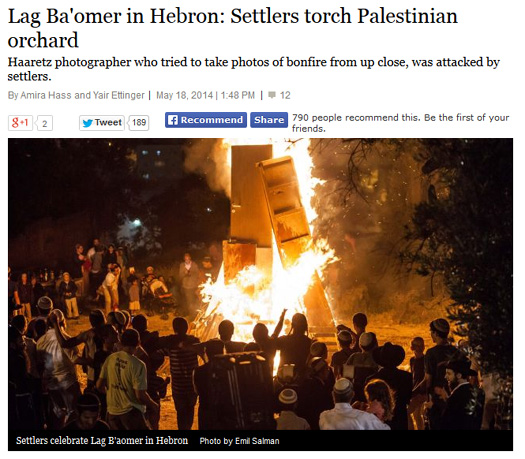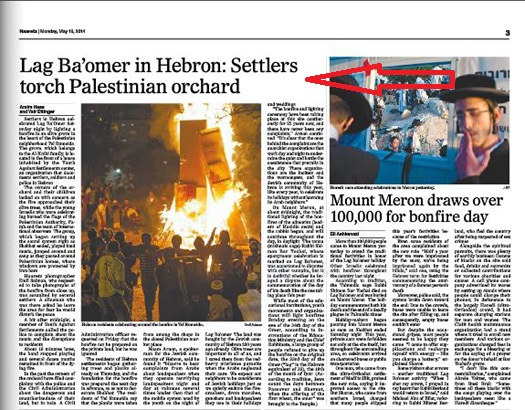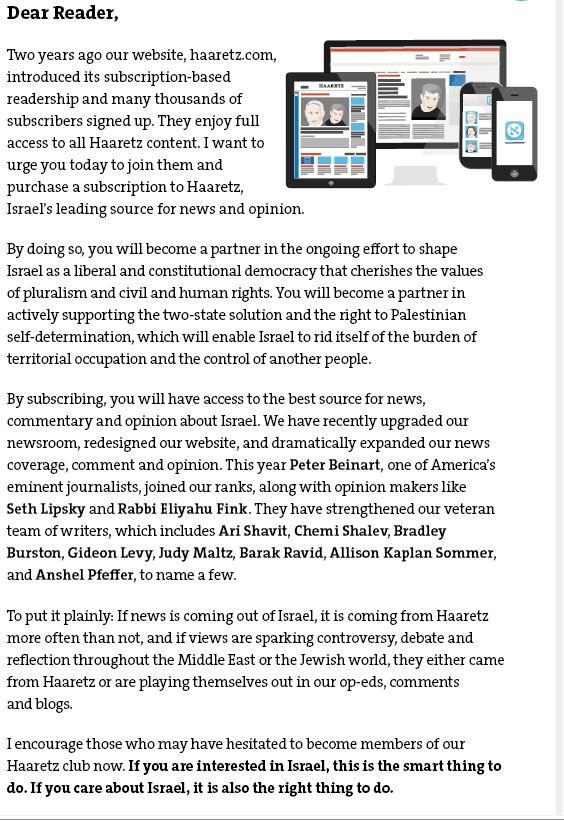One week after
Haaretz publisher Amos Schocken sent a letter to readers which
drew criticism due to its open acknowledgment of the paper’s commitment to “actively supporting the two-state solution and the right to Palestinian self-determination, which will enable Israel to rid itself of the burden of territorial occupation and the control of another people,” a false headline today underscores the pitfalls of advocacy journalism.
Online, and in print on page 3, the following headline appears today:
But Amira Hass’ accompanying article does not support the claim that settlers “torched” a Palestinian orchard. She wrote:
Settlers in Hebron celebrated Lag Ba’Omer Saturday night by lighting a bonfire in an olive grove in the heart of the Palestinian neighborhood Tel Rumeida. The grove, which belongs to the al-Knibi family, is located in the front of a house inhabited by the Youth Against Settlements center, an organization that documents settlers, soldiers and police in Hebron.
The owners of the orchard and their children looked on with concern as the fire approached their olive trees, while the young Israelis who were celebrating burned the flags of the Palestinian Authority, Fatah and the team of international observers. The group, which began setting up the sound system right as Shabbat ended, played loud music, jumped around and sang as they passed around Palestinian homes, whose windows are protected by iron bars.
Thus, according to Hass, the settlers lit a Lag B’Omer bonfire in the grove and “the fire approached their olive trees.” She does not say that the settlers “torched” trees, nor that the fire reached the trees. While she notes that settlers burned various flags, she makes no mention of the burning of any trees.
Indeed, the accompanying photograph shows a bonfire, surrounded by people, in a clearing among trees.
The Hebrew headline for the same story is accurate. It does not claim that settlers torched the olive grove.
Online, the headline is:
In English, it means (CAMERA’s translation):
Lag B’Omer: Settlers from Hebron lit a bonfire in an olive grove in Tel Rumeida
The celebrants chose to mark the holiday in the heart of a Palestinian neighborhood in private property belonging to the Al-Knibi family. At Mount Meron, the festivities commemorating Rabbi Shimon Bar Yochai begin
The English translation of the Hebrew print headline is:
Settlers lit a bonfire in a Palestinian grove in Hebron
Today’s erroneous headlines, which appear only in the English edition, is a continuation of the ongoing phenomenon of “
Haaretz, Lost in Translation.” The well documented pattern is consistent. The English edition has repeatedly omitted or downplayed information that appeared in the Hebrew original concerning Arab violence or wrongdoing, and has also added erroneous misinformation concerning alleged Israeli wrongdoing.
Repeated errors, virtually always going in one direction, are what readers can expect from a media outlet which is committed to a particular political or social agenda, as opposed to the tenets of journalism dictating impartial, factually accurate journalism.
Attempting to draw in new subscribers, Schocken appeals to readers:
To put it plainly: If news is coming out of Israel, it is coming from Haaretz more often than not, and if views are sparking controversy, debate and reflection throughout the Middle East or the Jewish world, they either came from Haaretz or are playing themselves out in our op-eds, comments and blogs.
I encourage those who may have hesitated to become members of our Haaretz club now. If you are interested in Israel, this is the smart thing to do. If you care about Israel, it is also the right thing to do.
We agree that
Haaretz has a profound impact on international media coverage, but we strongly disagree about the nature of that impact. By polluting the international discourse about Israel and by providing foreigners with misinformation,
time and time again,
Haaretz no doubt provides great sustenance to countless parties who are “interested in Israel.” It’s just that the “interest” of such elements does not entail reliable, accurate coverage of Israel.
Thus, with the latest false headline, about the “torching” of a grove that wasn’t, Haaretz fuels the flames in the ongoing war of words against Israel.




